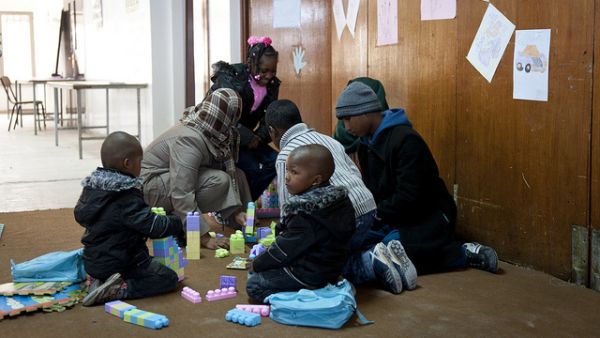by Rosie Alfatlawi
On Tuesday, Amnesty International issued a statement condemning the continued forced displacement of around 40,000 people from a single town in Libya.
مش فاهم شن السبب المنطقي أن تاورغاء قاعدين مهجرين !!
— عبدالله (@HerrEsharif) August 22, 2017
والساسة يستعملو فيهم كورقة سياسية لمصالحهم الشخصية !! https://t.co/TifH6W9oDD
I don’t understand the logical reason why the Tawerghans are still displaced. And the politicians work on them like a political document for personal gain.
The community of Tawergha in northwest Libya was driven out of the town in August 2011 by militia forces from the city of Misrata, 50km to the north. Homes were looted and burned, and Tawergha was transformed into a ghost town.
The move was seen as an act of revenge for Tawerghans’ alleged complicity in the three-month siege of Misrata by forces loyal to Muammar Gaddafi. Tawerghans were also accused involvement in the murder, rape and sexual torture of Misratans.
However, the displacement of the Tawerghans was condemned by rights groups as an act of collective punishment for the alleged actions of a few in the “loyalist town”.
“Revenge against the people from Tawergha, whatever the accusations against them, undermines the goal of the Libyan revolution,” said Sarah Leah Whitson of Human Rights Watch (HRW) in 2011.
“In the new Libya, Tawerghans accused of wrongdoing should be prosecuted based on the law, not subject to vigilante justice.”
The abuses committed against the Tawerghans also have a racial undertone. Largely descended from slaves, residents of the town tend to have darker skin than most Libyans. Andrew Gilligan, writing for the Telegraph in September 2011 described: “Along the road that leads into Tawargha, the Misurata Brigade has painted a slogan. It is, it says, ‘the brigade for purging slaves [and] black skin.’”
#تاورغاء لماذا صمت الجميع عن حقوقك ؟ ؟ pic.twitter.com/WoFxjQX5vY
— سالم الشرقاوي (@agly1988) August 22, 2017
Why this collective silence about your rights?
Now, six years on, Amnesty International reports that those Tawerghans are “still unable to return safely to their homes”. They remain scattered across Libya, many living in inadequate makeshift accommodation.
#اطفال_تاورغاء
— جمعة العرج (@gooma_2010) August 17, 2017
كيف لهذا الوطن ان يرتاح وهاؤلاء ينامون في العراء ....! pic.twitter.com/wTspthmL6M
#Children_of_Tawergha How can this nation relax while these [children] sleep outside?
This, despite a June agreement securing their return which was signed by leaders from Tawergha and Misrata, as well as the Tripoli-based, UN-backed Government of National Accord.
According to Amnesty, however, “the terms of the deal [have] not been implemented and some of those who have attempted to make the journey home since have faced threats and intimidation.”
The international rights organization has also criticized the deal for failing to hold any to account for what it describes as six years of “relentless reprisal attacks from Misratah forces.”
Heba Morayef, North Africa Research Director at Amnesty International, has said that “Libyan political factions must ensure Tawarghas are protected from all forms of intimidation, threats and attacks and order all affiliated-militias to allow the community to return safely to their hometown”.
On Twitter, many Libyans appear to support the return of the Tawerghans to their homes. Some tweeted earlier this month using the hashtag “we are all Tawergha” to mark the seventh anniversary of their displacement.
@TamyAlbadry tweeted: “#We_Are_All_Tawergha A disgrace in the history of modern Libya...The injustice continues after 6 years of oppression, subjugation and displacement. Where are the human rights for these humans!?”
@hadey010 wrote on Twitter: “Everyone took part in the suffering of the people of this good city. History with not be merciful... May God hasten the end of your suffering, and be with you. #We_Are_All_Tawergha”
@HAMAD_ALASDADE added: “#We_Are_All_Tawergha [When] the families return to Tawergha, Libya will return”
There have even been reconciliatory initiatives between the young people of Tawergha and Misrata.
In a picture of #Reconciliation
— Dialogue&Debate Club (@DDCLibya) June 30, 2017
A young man from #Tawergha prays with a group of youth from #Misurata & Tawergha in the old Tawergha mosque. pic.twitter.com/ZwtoAOeyDK
Yet, while many back the return of the Tawerghans to their town, Amnesty indicates that greater political will is needed to achieve it.
“Without clear political will to enforce the agreement to ensure the Tawargha’s safe return home, the public commitments made in June will be little more than an empty gesture,” Amnesty’s Morayef says.
- Anarchy and power play: A breakdown of Libya's key political players
- A Former Libyan PM was Kidnapped, Why is the UN-backed Government Doing Nothing?
Libya has been in a state of chaos since the 2011 overthrow of dictator Muammar Gaddafi. A chaotic patchwork of local armed groups controls much of the country, with rival governments in the east and west.







